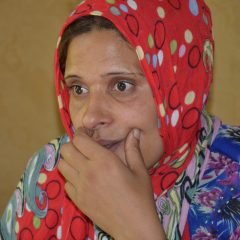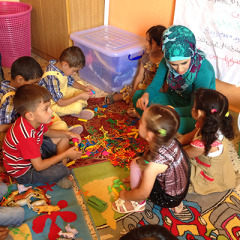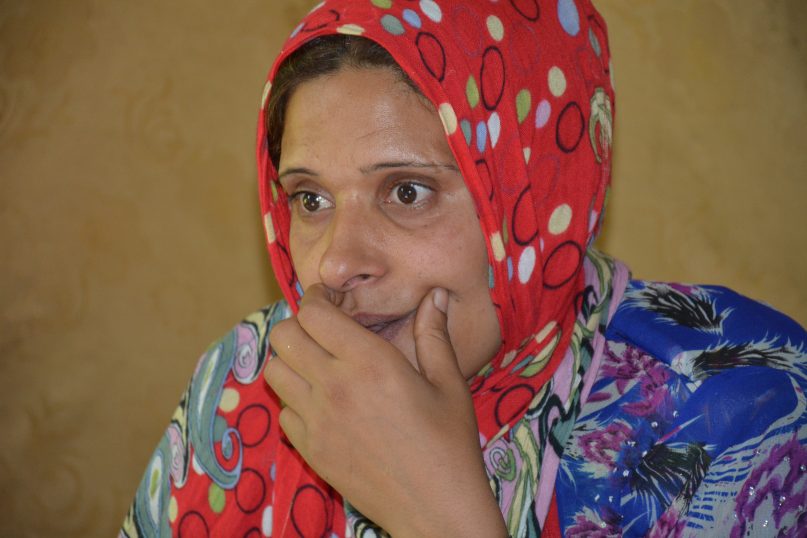The sea of tents reminds me of a scene from M*A*S*H from a distance, but there is no laugh track here. No, these Lebanese makeshift refugee camps or Informal Tented Settlements (ITS) are some of the most sobering places I’ve ever witnessed. Many of the more than 1.1 million Syrian refugees currently residing in Lebanon now call an ITS “home,” but the conditions are far less than pleasant.
I was invited to visit refugee settlements in Lebanon and Jordan by World Vision, a global Christian humanitarian organization focused on poverty and injustice. In these dwellings, I encountered stories of human suffering for which I was unprepared.
One story was that of Hamide, a mother of 10 whose entire family shares a two-bedroom tent with a dirt floor and walls constructed of old billboard vinyl. She lives in an ITS in Rawda, Lebanon. Her family was forced to flee here from Syria because of violence two years ago. She has no idea if her parents or extended family are still alive.

Hamide, a Syrian refugee and mother of 10, talks with RNS’ Jonathan Merritt from a tent settlement in Rawda, Lebanon. – Photo taken by permission; Image credit: Johnny Cruz
Poverty cripples her family’s existence in Lebanon. Three of Hamide’s teenage children now work in the fields for $4.00 US a day (despite Lebanon’s anti-child labor laws). She and her husband, Khalil, married off their 14-year-old daughter to a 22-year-old man she’d never met because they could barely afford to feed her. One child is afflicted with Hepatitis C and asthma that require expensive medicines, and Hamide must purchase formula for her 2-month-old daughter because she doesn’t produce milk.
The Syrian civil war has produced more than 3 million refugees like Hamide, and U.N. officials are calling it “the biggest humanitarian emergency of our era.” And on the front lines of the relief effort, working alongside UNICEF and UNHCR, are a collection of Christian relief organizations committed to ministering in the midst of catastrophe.
Chief among them is World Vision who, along with other humanitarian organizations, have come alongside the overburdened governments in the region to help address the needs created by the refugee crisis. World Vision is partnering with the World Food Program to distribute food cards that refugees can use to pay for groceries. They are installing latrines in Lebanon’s refugee tent settlements and water stations in Jordanian refugee camps.
Much of World Vision’s efforts focus on children, who are forced to shoulder a burden they are unable to bear.
“The Syrian refugee crisis is a children’s crisis. If you observe children in this region playing together it’s focused on violence. You’ll hear them tell stories about seeing limbs blown off and war,” says Meg Sattler, communications director for World Vision’s Syrian response. “Additionally, children outside of Syria are spending more time away from school and protection networks.”
World Vision runs education programs in Child Friendly Spaces (CFS) to help displaced children learn to read, write, and do math. They provide psycho-social programs to help them process the images of war that still plague their dreams. Thousands of children across the region have attended such programs, but many more need assistance.

Children learn and play in a Child Friendly Space near Jordan’s Zataari refugee camp. The camp houses nearly 100,000 refugees. – Photo taken by permission; Image credit: Jonathan Merritt
“It’s frightening to think that even if the conflict ends in Syria, an entire generation will return to their country without the resources to rebuild,” Sattler says.
Open Doors USA, an international aid ministry specifically focused on regions where Christians are experiencing persecution, also operates in the region. They too are involved in creating CFS’s and sponsor schools that need additional funding to service the growing population of refugees. They provide trauma counseling for those who are emotionally impaired due to violence and distribute clothing to thousands.
But what sets Open Doors apart from some other humanitarian groups is their commitment to empower local churches as the primary agents in the community development process. This, they believe, can be an advantage in regions like the Middle East.
“Non-government organizations have faced significant challenges distributing aid within Syria,” says Kristin Wright, director of advocacy for Open Doors. “But because we work through churches we’ve been able to skirt some of these challenges, especially in the most difficult to access areas.”
As a result, they have been able to distribute aid within Syria–where Westerners are restricted–and not just surrounding countries. According to Wright, Open Doors is now supporting 9,000 families in Syria every month through local churches.
In addition to World Vision and Open Doors, many other Christian ministries and humanitarian groups are providing support. Organizations like Samaritans Purse, Christian Aid, and Catholic Relief Services are coordinating efforts to meet needs throughout the region.
Sitting with Hamide in her wind-blown tent, I gather the courage to ask a most unusual question: “What do you do to relax and relieve stress?”
She pauses before responding: “I cry.”
In such a moment, tears are impossible to restrain. But Christian ministries across the region are working to dry as many as they can. As the crisis swells, it’s unlikely that they’ll be able to dry them all or even most. But their commitment to an ancient Rabbi who taught that leaving one’s neighbors by the roadside is not an option means they have no choice but to try.







